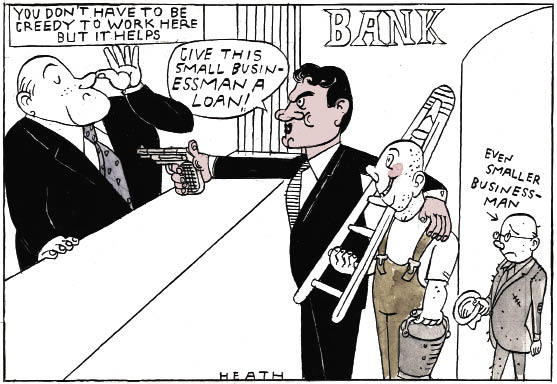Mr David Cameron, the Prime Minister, and Mr Nick Clegg, the Deputy Prime Minister, rather oddly wrote a letter to the rest of the Cabinet. ‘Deficit reduction and continuing to ensure economic recovery is the most urgent issue facing Britain,’ they said. Mr George Osborne, the Chancellor of the Exchequer said that banks had an ‘obligation’ to increase their lending: ‘Every small and medium-sized company that I have visited in recent weeks has had some problem with their bank,’ he said. The profits of HSBC, which took no money from the government during the financial crisis, doubled for the first half of the year to £7 billion. Lloyds, 41 per cent of which is owned by the taxpayer, made £1.6 billion, compared to a £4 billion loss a year earlier. Northern Rock Asset Management, the ‘bad bank’ part of the old Northern Rock business, made profits of £350 million in the first six months of the year; Northern Rock plc, the ‘good bank’ arm, which holds savers’ deposits, made a loss of £143 million. Santander bought 318 branches of RBS. The value of Britain fell by £94 billion last year, according to the Office for National Statistics, which valued all the nation’s houses and infrastructure at £6,670 billion.
The Prime Minister welcomed President Asif Ali Zardari of Pakistan to London. A week earlier he had said in India: ‘We cannot tolerate in any sense the idea that this country is allowed to look both ways and is able, in any way, to promote the export of terror.’ A small protest in Karachi had carried a banner reading: ‘David Camroon the loos mouth.’ Mr Zardari said on the eve of his visit: ‘I believe that the international community, which Pakistan belongs to, is in the process of losing the war against the Taleban.’ Mr Damian Green, the Immigration Minister, promised to ‘crack down’ on ‘bogus colleges’ after official figures put the number of non-EU students who came to Britain last year at 313,011, up 77,716 on the year before. A Sussex vicar was convicted of conspiring to facilitate illegal immigration by conducting 360 sham weddings. After being offered bail, Mr Asil Nadir, who fled to Northern Cyprus in 1993, is to return to Britain to stand trial. A poll of consultants and trainee surgeons by the Royal College of Surgeons found 90 per cent thought the EU working-time directive had had an adverse impact on patient care. A poll of 106 political historians ranked Mr Gordon Brown tenth out of 12 postwar prime ministers, above Alec Douglas-Home and Anthony Eden.
Monsoon flooding in Pakistan affected three million people, killing more than 1,500. The Swat Valley, recovering from war against the Taleban last year, was badly hit. At least 45 people were killed in attacks by Urdu speakers on Pashto speakers in Karachi. World wheat prices reached their highest for 22 months because of wildfires in Russia, which a quarter of a million people were fighting. President Barack Obama of the United States confirmed the end of combat operations by American troops in Iraq this month, although 50,000 of the 65,000 will remain until the end of 2011. An application to build a mosque next to the destroyed World Trade Center in New York cleared another planning hurdle. BP succeeded in a ‘static kill’ of its oil well in the Gulf of Mexico, which the US government says had leaked 4.9 million barrels of oil since 20 April. A beer-delivery driver shot dead nine people at Manchester, Connecticut. Somali pirates captured a 17,300-ton freighter in the Gulf of Aden. President Mahmoud Ahmadinejad of Iran survived a hand-grenade attack on his convoy. Iran declined the offer of President Lula da Silva of Brazil to give asylum to a woman sentenced to death by stoning. Benfica agreed to sell the Brazilian midfielder Ramires Santos do Nascimento to Chelsea for £17 million. A hailstone weighing 1lb 15oz fell in South Dakota.
Israel said it would co-operate with a UN investigation into its raid on a flotilla bound for Gaza in May. A man in the Jordanian Red Sea port of Aqaba was killed by a rocket apparently aimed at the Israeli resort of Eilat. An Israeli was killed by fire from south Lebanon, where Hezbollah is entrenched, and three Lebanese soldiers were killed by Israeli fire. King Abdullah of Saudi Arabia and President Bashar al-Assad of Syria jointly visited President Michel Suleiman of Lebanon to warn the country against violence. Trouble had been expected after a UN tribunal accused the Iranian-backed Hezbollah movement over the killing in 2005 of the Lebanese prime minister Rafic Hariri. WWF and Oxfam apologised for two of its delegates at UN climate talks in June having broken the nameplate of Saudi Arabia and photographed it in a lavatory. Saudi Arabia is to prevent the use of the instant messaging service on BlackBerry mobile phones. CSH






Comments